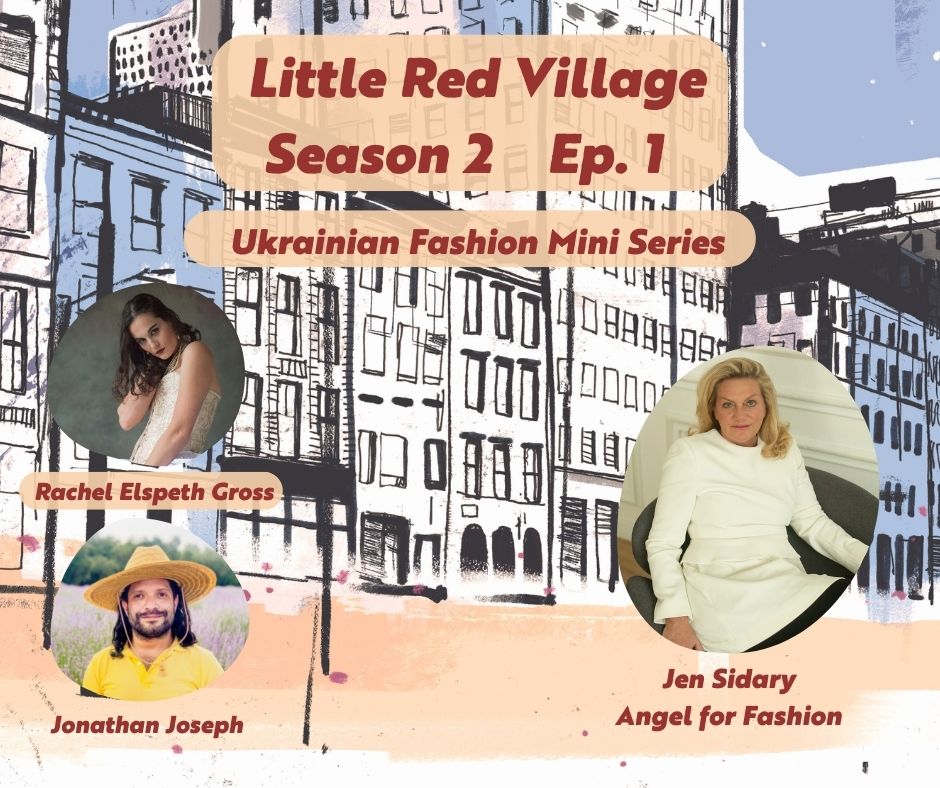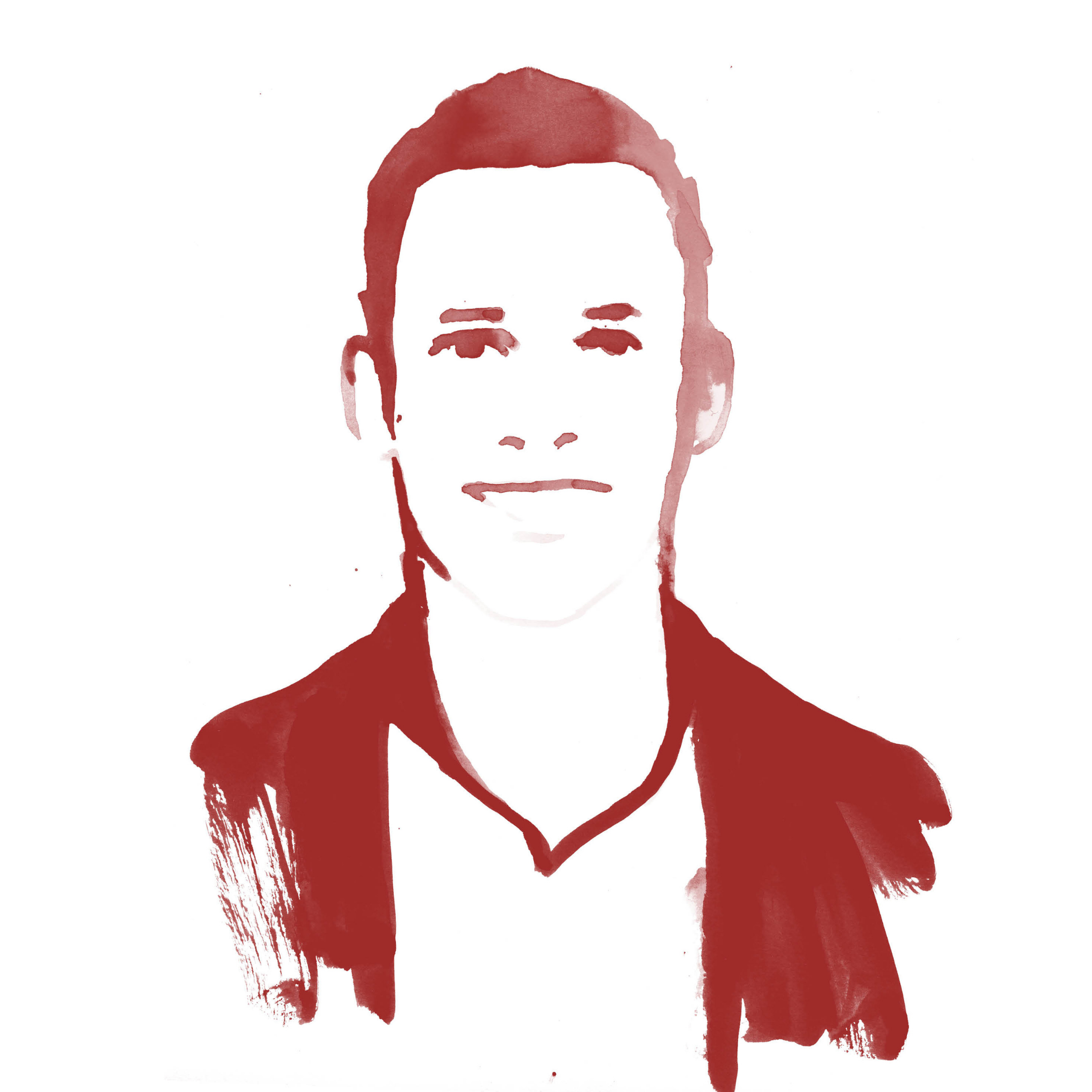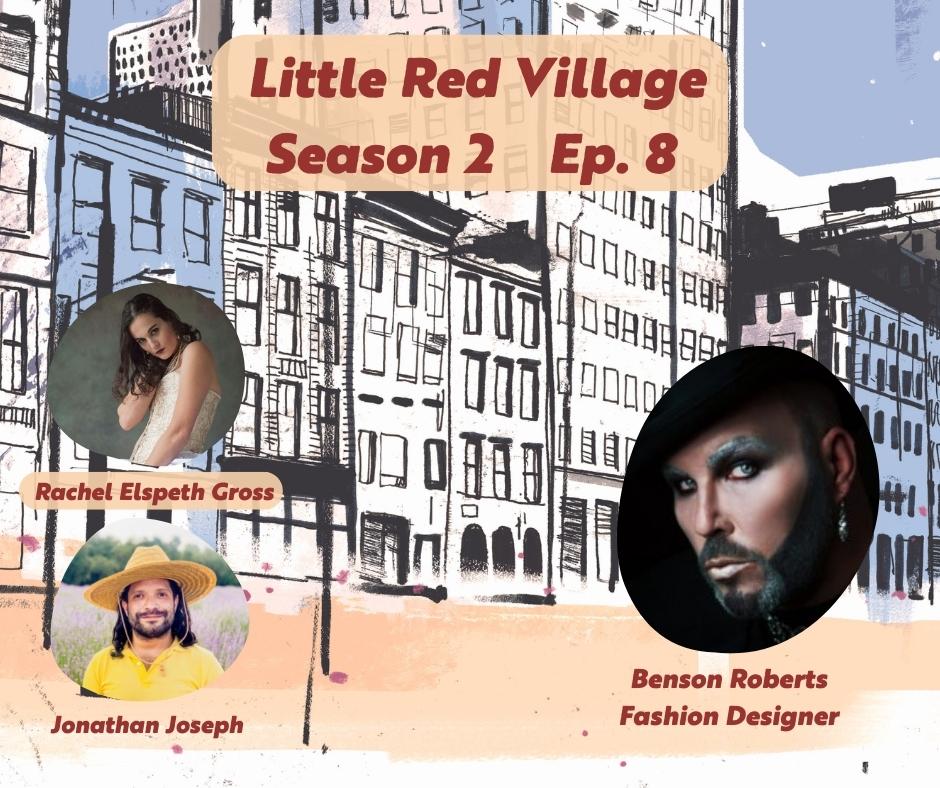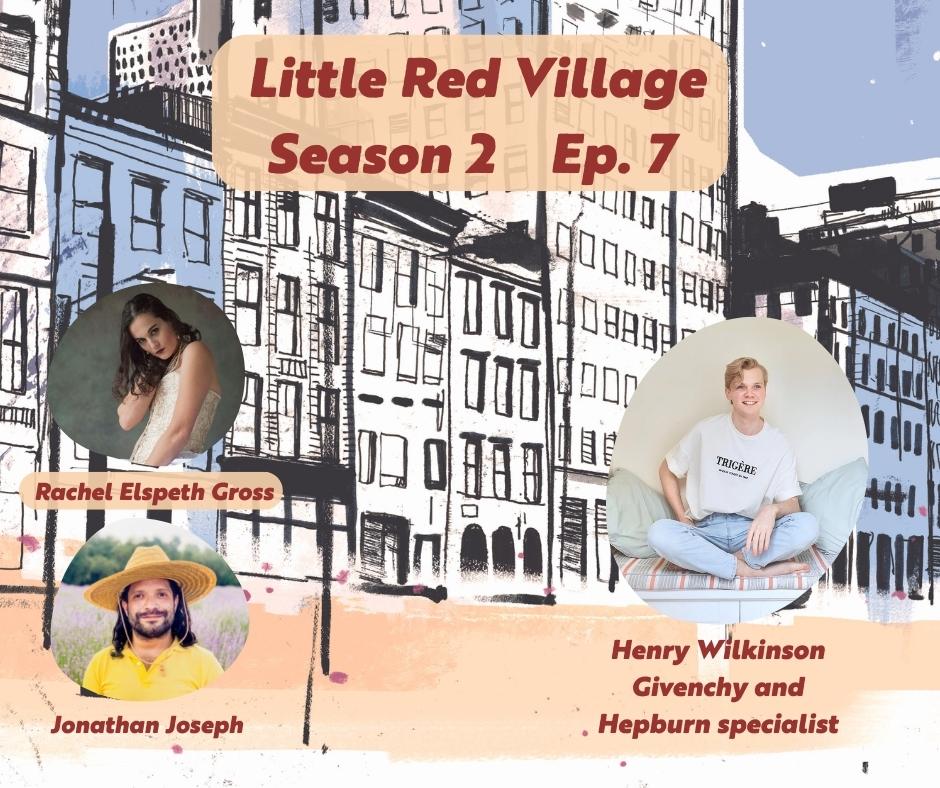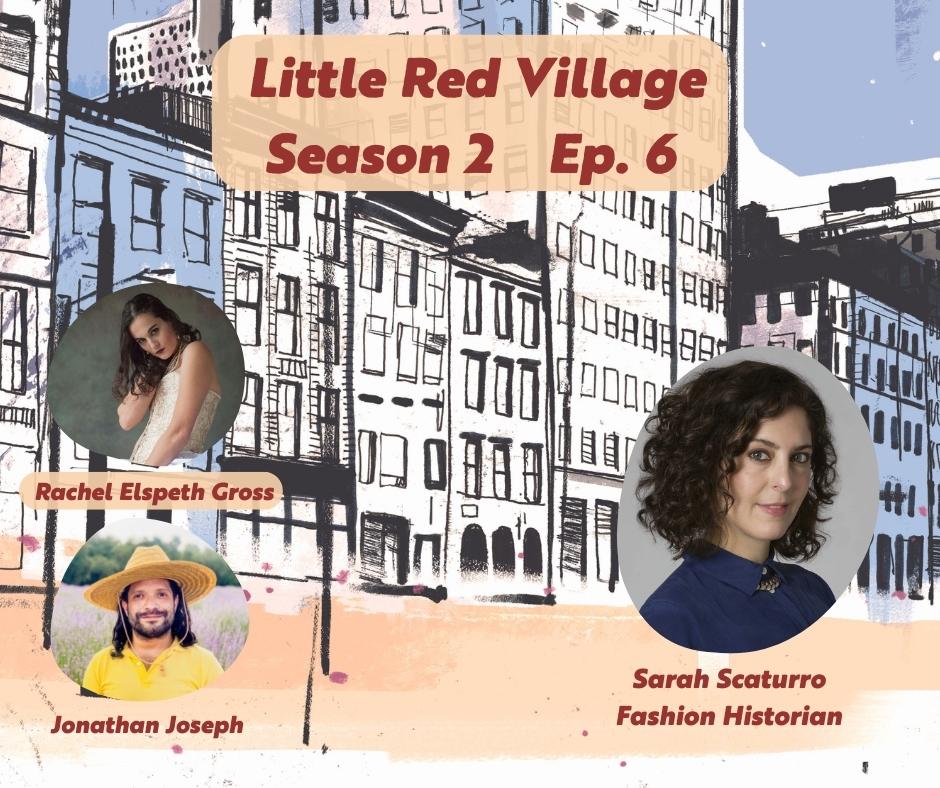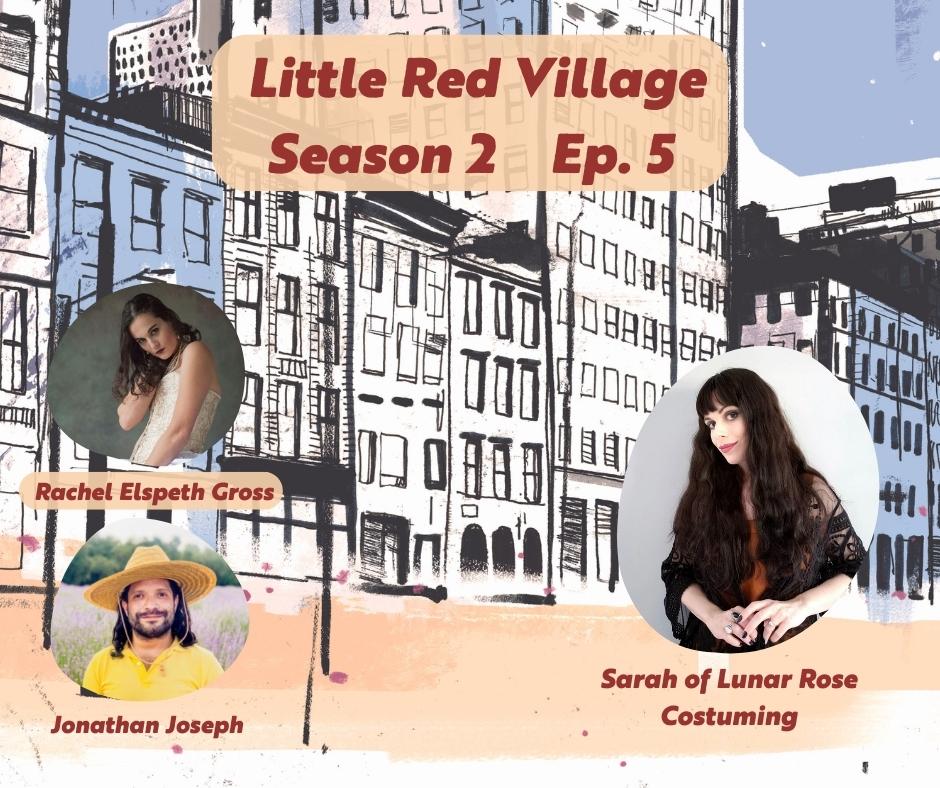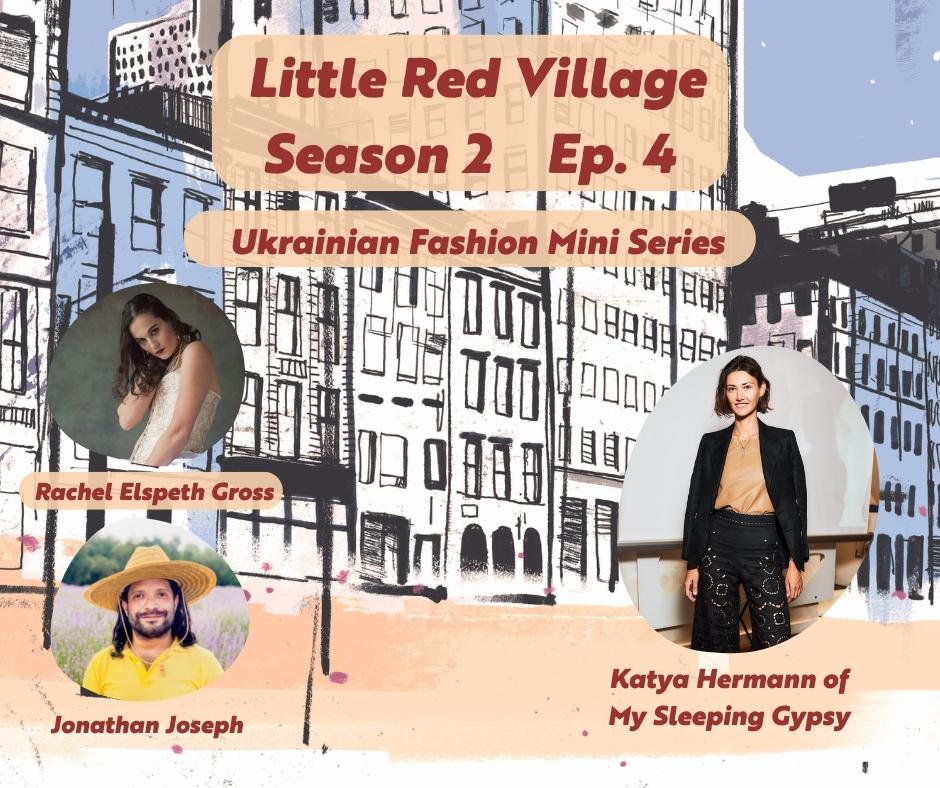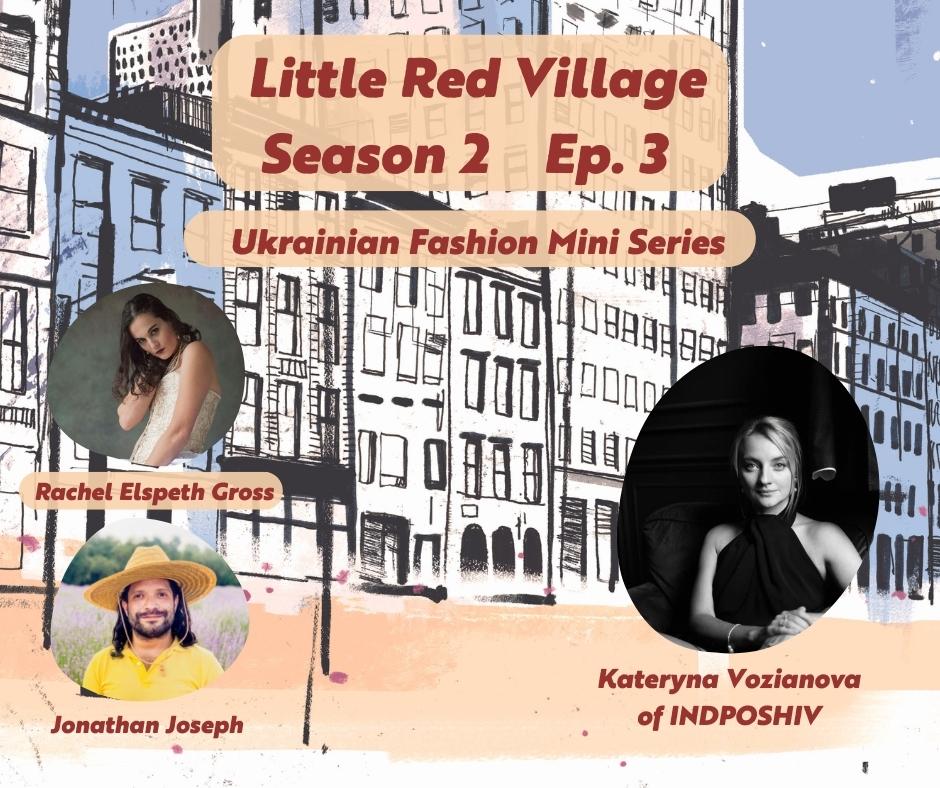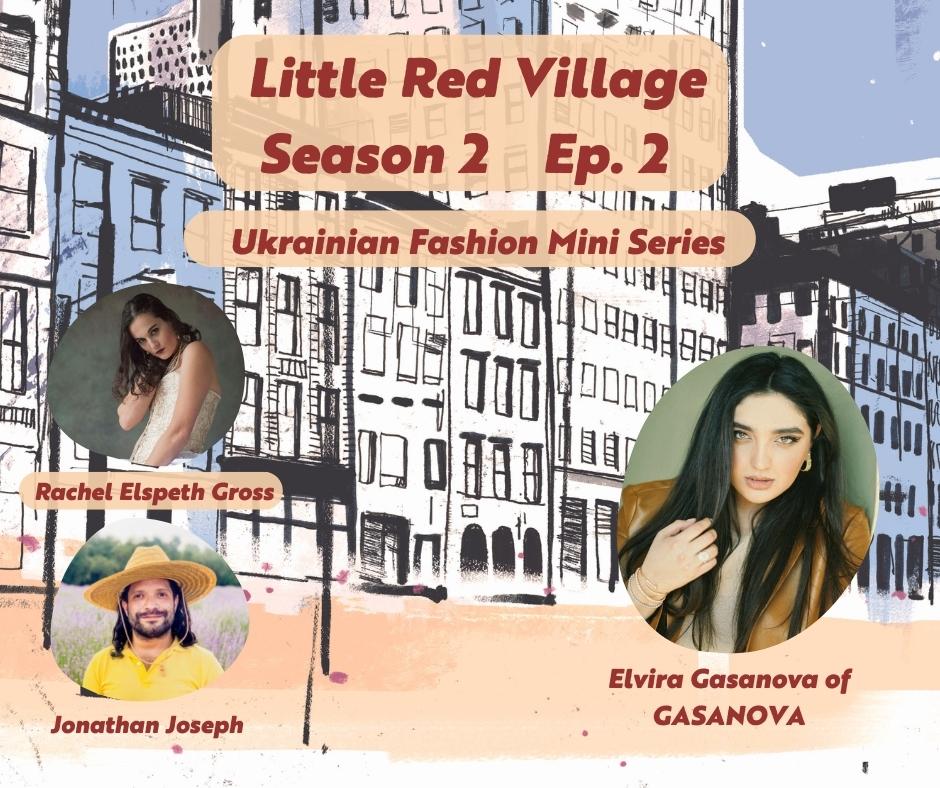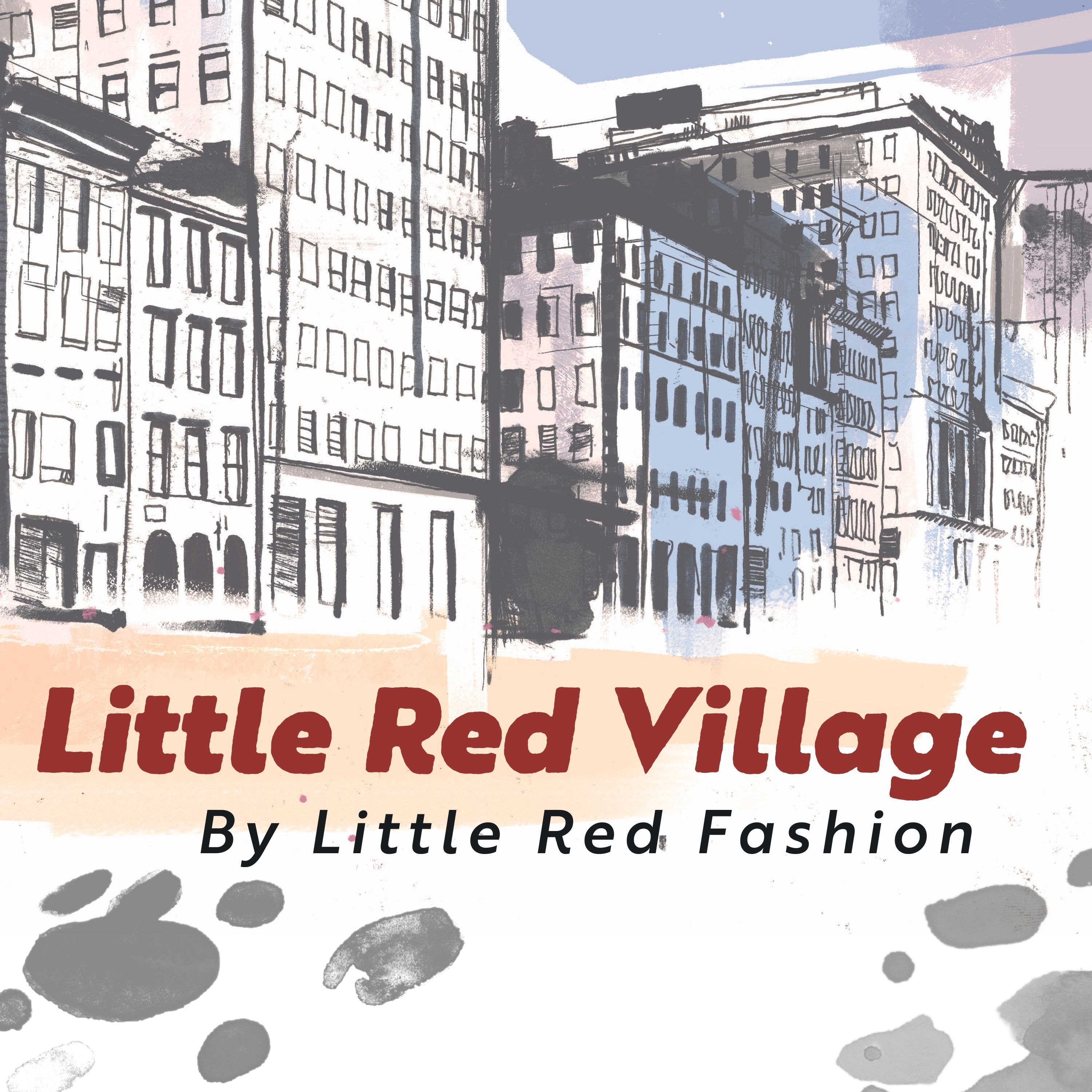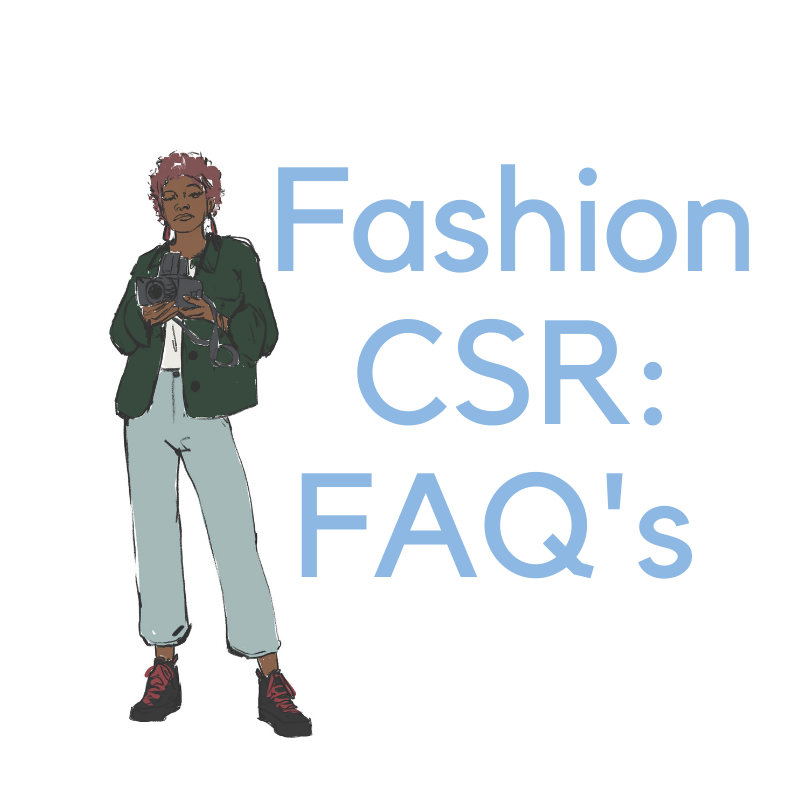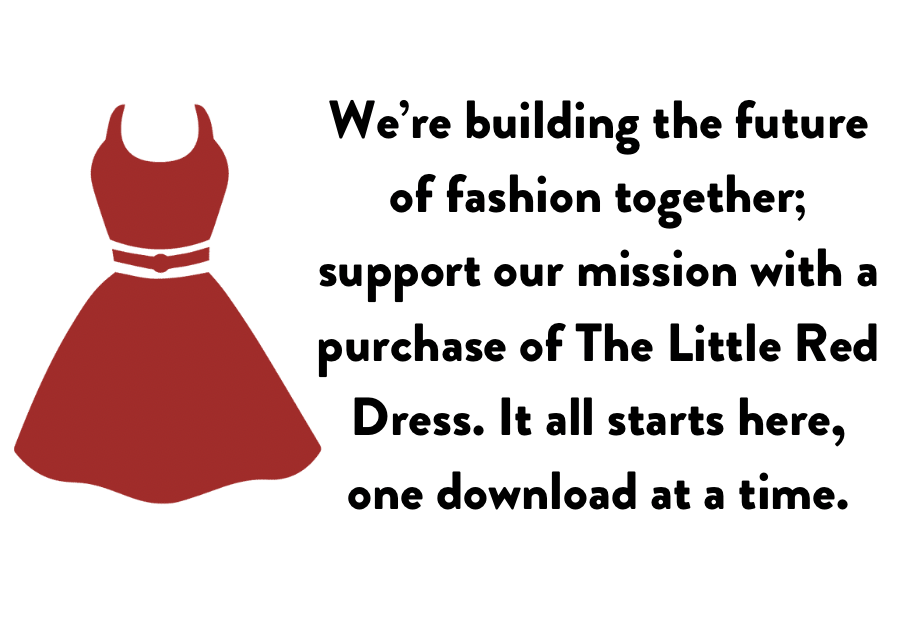Season 2 Ep. 1
Links to listen
Links to all other podcast platforms can be found here.
Speakers
Rachel Elspeth Gross (Host)
Jonathan Joseph (Host)
Jen Sidary (Guest)
Jonathan Joseph 00:18
Hello, welcome to today's episode of Little Red Village podcast. I'm your fearless leader Jonathan Joseph with my comrade in arms Rachel Elspeth gross and today's special guest Giemsa. Gary, Rachel, how are you today?
Rachel Elspeth Gross 00:32
I'm doing great. I'm so excited that we have the chance to talk to you, Jen, just a little background for everyone. We met through a mutual friend, Megan, who was actually a guest with us last year. And Jonathan and I was really wanted to find a way that we could amplify voices that we could bring attention that we could make personal connections between people in our industry, here in America, with Ukraine, and hopefully in other parts of the world, we feel like it's a really important time to show not just that work is happening. But that work of exceptional quality is being produced and being done under the worst possible circumstances imaginable. I don't mean to laugh. It's just like, how can nobody be yelling about this? So
Jonathan Joseph 01:14
absolutely, the work that Jen is doing is so profoundly inspiring. And part of what those of you who've listened to a number of our episodes in seasons past and you know, by the time this airs in season two will know we love peeling back the layers and pulling at the threads of all areas of the fashion industry, particularly those that are under discussed underrepresented and undervalued in many ways. And being able to share the work of gems amazing project is something that is so important to me in terms of using fashion as a lens to talk about vital issues that affect people every day in their everyday lives. And with that, I would love it if Jen would introduce herself and her work and talk a little bit about how she got started on this path.
Jen Sidary 01:56
Well, hello, everyone. I'm Jen. And I've been working in the fashion industry for sadly, about 30 years, I think now I've worked at some pretty incredible companies. I spent a good seven and a half years running the luxury website for Zappos. I lived in Henderson, Nevada at the time and learned quite a bit about the E commerce space was in like 2007. I started working there. And then I left Zappos and moved to sunny Los Angeles to be the president of sales for Vivienne Westwood America, I had a long standing relationship with Vivian and the incredible team there in London. So it was really a natural kind of progression to leave and do that ended up working with a couple of Brits who had a multi brand store in Bristol, actually. So it was living between Bristol and Los Angeles, which people thought was super funny. And then oddly, during COVID, a couple gay friends of mine had been living and working in Kyiv in Ukraine, and I saw it instead of just sitting around my apartment, when everything was closed and looking for new opportunities on LinkedIn or something. They invited me to come and live with them and their son, which I don't have any kids. So this was super new for me. It was in October of 2020, I bought a one way ticket to Ukraine. So my friends and family thought I was completely insane, and that I had lost my mind. They certainly saw that I wouldn't be safe. But I was like guys, it's Dominique and Jeff and their kid, like everything should be fine. And they were completely right. And the perception of Ukraine, I think was completely wrong. So I landed in November 2020, and just immediately fell in love with the country. Its fashion industry and its people
Rachel Elspeth Gross 04:06
Is the couple the people who are associated with 91 lap is that the?
04:11
no no of the two guys I'm talking about their names are Dominique Piotet and Jeff Michaels. In fact, Tony Shea introduced us back in the day, and we've just maintained our friendship. I actually knew them before they adopted their son and Dominique was the one who was really pulled to Ukraine. He is the CEO of unit city and unit city will be once they can continue building again, the largest Innovation Park in all of Europe and Eastern Europe. So he's the CEO of the project. So that's why they were there and they invited me and, you know, in typical Tony Shea fashion, I took a leap of faith and thought that one way I think it definitely changed my life forever.
Jonathan Joseph 05:03
I would imagine working for Tony Ledoux. That I mean, he is a trailblazing innovator. I've been obsessed with Zappos since the beginning in terms of just their model and his philosophy and work culture and everything. And I think, you know, working for him most definitely, I'm sure I'm being friends with him. Most definitely. It has shaped I would think your ethos for what you're doing now. Is that correct?
Jen Sidary 05:24
Definitely, I learned so much at Zappos and you know about e commerce and websites. And of course, the key thing that, you know, Tony really made his mantra, which was customer service. So our angel for fashion website is certainly built around a lot of those principles. And without my experience at Zappos, I certainly wouldn't have been able to launch this website.
Rachel Elspeth Gross 05:50
So can we pause for a second, could you explain to our audience what angel for fashion is, that's your project right now, that literally made me giddy when I was reading about it?
Jen Sidary 06:00
Yeah, it's me, too, is really exciting. So I mean, just to give you a little history, I had been consulting with some Ukrainian fashion brands, since about January of 2021 of Dominique also introduced me to this guy, David Anderson. He is the Chief of Party which sounds like such a cool title until you Google what a Chief of Party does. And then it's not doesn't sound like such a fun. Chief of Party for USA ID Ukraine's competitive economy program. Basically, we give money to underdeveloped countries to help them grow their SMEs, I was lucky enough to meet David. And last summer, I pitched him an idea to bring four Ukrainian fashion brands to New York Fashion Week, which these grants of course take forever normally to get them going. But David worked at lightning speed like me. And last September, I brought four Ukrainian brands to New York Fashion Week, and this February, I brought six the week the war broke out, which made it very interesting that all of these things really is what led me to developing this angel for fashion.com website. And so it's a multi brand Ukrainian website. Currently, we now have three weeks in 37 of the most prominent Ukrainian brands on the site. Other products are all featured. Some of them, of course, are live products that's already made. Some of it is pre sell items. We've already had some incredible sales on the site, which is crazy. In the first three weeks, we've even shipped 70% of the orders, the product goes ground because there is a local shipper name, Nova posta, that is still shipping ground shipments from Ukraine. So it goes ground and then once it leaves Ukraine, then it hits the air and will hopefully be hitting customers doorsteps very soon.
Rachel Elspeth Gross 08:06
That's amazing. There's so much about all like we have to talk about, but I was reading there's a Women's Wear Daily article about your work. And it was talking about how it's kind of this is not a government organization, it's a business thing. These people are all coming together. And they are working not only for themselves, but for their community. Right.
Jen Sidary 08:24
Yeah, USAID really just kind of helped lead me to this moment. I mean, they aren't a part of the project. I am the CEO and founder and the money to fund the project is all coming out of my savings account. In my opinion, I feel like it's how I'm giving back to Ukraine is to really invest not only in helping these brands and designers continue to pay their employees during the war, but also make sure that they continue their businesses and help them grow so that when the war ends, and Ukraine wins, they will be as as they will. They will have hopefully even bigger businesses and what they had to begin us.
Jonathan Joseph 09:10
I think what you're highlighting here is so important in the sense that you're doing is a genuine example of actionable equity, you're creating equity in an inherently disparate situation for designers who are profoundly suffering the effects of this war in the Ukraine. What I love about it, especially from my vantage point here at Little Red Fashion is that you are making Ukrainian fashion for everyone in a way that is genuine reciprocal in terms of supporting this industry and showcasing and highlighting it in a way that nobody's done before. I would be curious to know and I'm sure that our listeners would be curious to know you highlighted how you got your start in the industry and how you moved through it and got to this point. One thing our listeners love to hear is what would you say is your URL earliest fashion memory for yourself. What is the earliest moment you got the sort of fashion bug when said, Oh my god, this is something that resonates with me clothing, apparel fashion, were you into it as a child like was this bad I
Jen Sidary 10:13
was I was I was always into fashion. I'm from Kansas City, actually. So I'm from the Midwest. And we used to have a Gucci store on the plaza in in Kansas City. And I remember, my parents did not have a lot of money. But somehow I talked to my mom and to find me, a Gucci handbag when I was quite young. So I had a Gucci Weekender,
Rachel Elspeth Gross 10:42
Excellent negotiation skills. (laughs)
Jen Sidary 10:44
I don't know how I did it, I really don't my poor mother and father because they worked multiple jobs to try and give me everything that I wanted. So from then I remember that and I was either going to be an actress, or I was going to work in fashion. So I just felt like fashion, I had a better chance of actually succeeding, honestly, is why I picked it then into fashion forever. I always say I know where all my money is, it's like hanging out.
Jonathan Joseph 11:18
Reminds me of that line from the movie anti main when the stock market crash happens. And her friend Vera, Charles says, and everyone thought I was such a fool for spending all my money.
Jen Sidary 11:27
I regret all the things I don't purchase more than the things I purchase.
Rachel Elspeth Gross 11:35
There's a pair of golden pants that I did not buy in 2012. And they haunt me to this day.
Jonathan Joseph 11:42
Yeah, vintage all the time. Because I tried it either outside, I'm big on thrifting and vintage and really D accelerated sort of the growth of my closet and in the past and many years. And when it's a vintage piece that you just can't stop thinking about and then you go back and you're like, and it's gone.
Rachel Elspeth Gross 11:57
and it was the only one.
Jen Sidary 12:00
I still have that Gucci bag and watch, by the way, good for you.
Jonathan Joseph 12:05
I still have my first Louis Vuitton bag that I bought myself with my first consulting fee back when I was much younger, that's going nowhere, those nostalgic pieces. I mean, that's part of their story. That's what makes fashion so powerful that these things tell
Rachel Elspeth Gross 12:19
They really are and there's so much in there. That's one of the things with your work, Jen that I personally and now we're with Jonathan, it's really fascinating, because there's so much history of the world, like everything from economics and commerce to uniform design, which I'm sure we'll get into, because all of these different places that fashion intersects that fashion affects the fashion impacts. And I get so tired of people pretending like it's only access. And I love that you are framing the work of these people that you're supporting, with not focusing on price point and not saying excuse this or please do that. You were saying you will support them. This is what this work costs. You know, please feel free to show your support. And in real time. I know a lot of people that I've talked to in my own life, people, things you read online, Americans aren't always comfortable donating money to a charity or to a foundation because they're not sure where that money is going to go. And I feel like what you're doing what you were saying is already livestock. In some cases, you could buy something and help someone keep their business going. Or if you're helping a collection get produced by pre buying, like you were saying you're making sure that that business has its best chance of continuing. How did you kind of get to that model? How did that happen?
Jen Sidary 13:34
It was literally I'd come home from New York Fashion Week on a Sunday and one of my brands catcher of scuff footwear, the designer and owner, Alina catcher of Scott called me from a bomb shelter and said to me, oh my god, Jennifer, I have so much inventory, because she has two stores in Ukraine and her own factories, but not only stock the raw materials and she was like maybe you could start a Kickstarter fund for us. But she's like, we really don't want handouts and donations, we really do want to get rid of this product. So I fell asleep that night and woke up the next day and was like, Okay, I need to start a Shopify website started calling some one of my old clients his name's Kevin, he owns this cool company called speech in Barcelona. And then I easily got hooked up with a development team, that Mark tag who incredibly after literally one call, designed this gorgeous website. I mean, I certainly never thought that I would start a website with a dropship model because Zappos was always very against that way of doing business because you can't really control the customer experience. But in this instance, it was the The only possible way to make this happen and of course, a lot less expensive for me than to have to buy all the inventory. There's no way I could have pulled it off either. So it all just came full circle and worked out. And then on top of that I had, I did have a fabulous Ukrainian designer that I had brought home with me from New York, she was not showing in New York Fashion Week, she just happened to be there, Valerie Cole Vaska. And of course, she became a refugee in our country. And she was in New York, and she was kind of sad. And so I was like, Girl, come back to LA with me. So this very glamorous designer ended up sleeping on my couch for five weeks, and really was quite instrumental in putting this together, because I knew some of the brands, but she knows all of the brands, right? So she'd started making calls and 37 brands later, here we are.
Rachel Elspeth Gross 16:01
That's really impressive. I mean, with three weeks of business, I mean, I think that by anybody's metrics, that would be astounding.
Jen Sidary 16:08
Were working like crazy, for sure. Need. I love the working in my one bedroom apartment in West Hollywood. So I mean, probably somebody should have been filming us, I think, I think definitely should have
Jonathan Joseph 16:26
I would have watched that reality show. In a minute.
Jen Sidary 16:28
Oh yeah, Oh yeah, I don't think you can see pictures of her. But yeah, the two of us together. And we were not even friends. It was crazy. I had literally met her one time in Kyiv, when she did a fashion show at the department store there. And then we had one dinner together in Kyiv. So this was not what the girl that I was friends with. I mean, now of course we are super close and talk every single day but that was a brand new friendship really.
Jonathan Joseph 17:03
kind of makes me think of the beginning of that show from back in the day. What was it to perfect strangers.
Rachel Elspeth Gross 17:13
better shoes, definitely.
Jonathan Joseph 17:14
Much better shoes, I'm sure. I'm sure. But what you spoke to in terms of the model definitely resonates with Rachel, I mean, here Little Red Fashion, that's an independent publishing company doing a lot of things against the grain, we run on a pre order driven model, because we don't believe in the traditional publishing models idea that you should just buy 10,000 copies. And if only 5000 sell, you just burn or destroy them, the environment can't sustain that, businesses can't sustain that. And when you're not one of the big five publishers, you got to get creative. And so I definitely tip my hat to the creative solution of really making it go because the work you're doing again, is, is so so important.
Jen Sidary 17:50
Yeah, it's been fun, I have to say, and I've met so many new brands, I mean, you know, I've been in this industry for so long, like, the product is cool. But it's the people that change and shape our lives. And I have really built my career around developing deep relationships with people hence why I was invited to go live with Dominique and Jeff and Ukraine. And I already feel like I have such an incredible connection with some of these designers I had not even met in Ukraine yet. So we're all kind of planning a big party together for when this ends, and I'm super excited to meet some of these these guys I've never, never met before.
Jonathan Joseph 18:41
Oh, that's so amazing. That's so amazing. I think fashion as an industry is one of those things. And what we try to do with the Little Red Village podcast here, is really put a face to the industry to all of the parts of the industry, the hidden jobs that nobody talks about the hidden struggles that nobody talks about, and really bring those to the surface to inspire kids to see and their families to see that there are so many things you can do to be in fashion, regardless of what your interests or talents are. And that this industry, which is about things, you know, we produce garments, we produce objects, but it is driven by people and people make fashion what it is, and when it is one of the most inherently social fields on Earth. And so I think when you speak of, you know, it being about the relationships that is probably I think one of the most important takeaways after we always do these interviews that I you know, I'm always like basking in the glow of these conversations, because afterwards I'm just so jazzed up and energized by every single individual who's working so hard to do so many beautiful things. And I think that with, you know, with your project, especially, I mean 37 designers in three weeks, I am so excited to see where you are a year from now.
Rachel Elspeth Gross 20:00
Oh my god. Yeah,
Jen Sidary 20:01
I know me too. I mean, I will tell you just to go back to these relationships, as amazing as it's been, has been about as painful as it's been, because every day, you really are talking to these people who are still in this horrific war situation. And, you know, you definitely feel their energy. I mean, they're so happy to talk to me. But at the same time, it's every day, you're just hearing some other story about what has happened to them. For example, we've got Bob bass set, okay. And his company makes masks. Well, his company was based in Harkey Eve. And so he's literally waiting for his tools to arrive, are keen to to make these masks that we sold to a customer when one of the guests I'm gonna have on your podcast is cassava. And we met and started talking. She's from danesco. And already fleed, that part of the country years ago and not getting left Bucha, one day before the Russians arrived, it is just you can't, when you're this close to the story's unbelievable. I mean, I don't cry. I'm not a crier. But I have to say I do shed tears every day because of what's happening in Ukraine.
Rachel Elspeth Gross 21:39
Absolutely. And that's kind of exactly what Jonathan and I were thinking, as we've been trying to talk about this. And one of the reasons I was so thrilled Jen, to find you is that those personal connections you're describing, you can't ignore them. They make you feel stuff like even hearing, you, I get like goosebumps right now, I want people to feel connected to other people, especially in Ukraine, right? The second I want to look at my audience online, I want them to look at their audiences online. And I want them to see their friends and family, and then look at Ukraine and see reflections of that I want them to see themselves in the people that they love in what's happening right there. Because the ceiling way I can think that we can convince more help, we need more help.
Jen Sidary 22:22
That's part of the reason. So the way that Angel for Fashion works is you go online, you buy a product, suddenly, you're an angel for fashion. And then we pass your order off to the brand directly. And the brand actually contacts the customer and they start to exchange emails about possibly like measurements, like somebody ordered a for love dress and to make to custom make a for love dress, we need your measurements so that it fits you absolutely perfectly, they start to kind of develop this personal emotional connection. And very soon some of these customer emails will be shared on the website, because it is incredible to see these customers, which are angels. Tell these brands like, hey, we feel horrible for you. We wish our country was doing more. We're standing with Ukraine, I get to talk to them every single day. But if you have no connection with anyone in Ukraine, and then I connect you with like a real person, and you can start communicating then it's a whole different level of giving than just oh, I'm gonna just throw 20 bucks on this website, and who knows where it's gonna go?
Jonathan Joseph 23:47
No, it's Oh, my God. Absolutely. It is inherently more emotional. And I'm glad you said that, Rachel, because I just think they remember, I went to grad school for philanthropic operations and fundraising management. And I distinctly remember a conversation where we were talking about as a major gift officer, like, what feelings are you going for, and I would always use the analogy of you want the person who's donating to feel like they just walked out in Neiman Marcus with a brand new fur coat, or to feel like they just got this big thing. And I say that because honestly, this is the power of fashion. To be inherently relatable to all of us, we all get dressed every day. And clothing is unique in that it is ubiquitous for all of us. And if it is the conduit through which these connections can be formed, these stories can be told and this perspective can be gained. Then we can move mountains I think any of us who've been in the fashion industry for really any length of time. See that? And what you're doing is taking it into a very empowering corner of reality through with this war torn tragedy. And I think my guess is that a year from now, you will have inspired so many others to try and affect change in other war torn areas. One of the dialogues we see all Little Red Fashion social media right now. And in general, for example, is everyone's talking about the Ukraine? What about Palestine? What about Yemen? What about all these other areas, and I think what you're doing is providing a very special use case for how to affect and actualize broad change through the fashion industry in a way that's never been done before. And I think that is so profound.
Rachel Elspeth Gross 25:20
And in real time, Jonathan, when we were chatting, right before we started with this, I can't remember who said it, but, but none of us can think of a time during a war, when something like this happened. There's plenty of examples of post war communities coming together or international aid being given. But when has the country fought so hard for itself for its industries, and done so many creative things to make sure they survive? I mean, I'm gonna have to like dig, I'm gonna have to go look, because I can't think of it.
Jen Sidary 25:49
I know, one of my friends about it, and we really couldn't, he couldn't think of the case that had happened, at least in the fashion industry where somebody had done this during a war period. I always think when people tell me things are impossible, I tend to very much disagree with you, because I can go down. I think anything's possible.
Jonathan Joseph 26:11
Yeah, same way. That is Rachel. And as people, when we started this little red journey, there were a lot of people that said, Why does a kid's book need augmented reality? The fact of the matter is kids books need augmented reality because kids need context, especially when it comes to something as powerful and self defining as fashion if we want to teach kids how to have better relationships with clothing, so they can understand who made it, where it came from, what went into the process, so that we can solve the systemic issues to get away from the fashion industry business as usual for many decades, then we need to reevaluate that relationship and teach them how to understand clothing in a new way. And I think technology much like with what you're doing facilitates that accelerates that and makes it much more effective. And so I was so thrilled that you have been so gracious to bring us these designers from the Ukraine so that we can talk to them to really peel back the layers on how they started in fashion and how they've been affected by everything that's happening to them and how that informs their their fashion ethos, because those stories are essential,
Jen Sidary 27:12
like feeling with kids, too. Don't you kind of think that it is really the first decision that they get to make that makes it that right, like so. I mean, they're not starting to wear makeup first or what not. But I mean, I just know from Dom And Jeff's son, who I now spend so much time with Lucas, he feels so cool when he picks out his out, you know, and yet walks out of the house like a stronger, more confident human.
Rachel Elspeth Gross 27:45
Its armor, it can be armor.
Jonathan Joseph 27:47
will give me the fashion bug. And my first early social memory as someone with a toxic cerebral palsy who grew up with as the leg braces, fashion was my armor because my mom looked at me being brutally bullied for it, and said, Okay, we're gonna solve this problem like the proactive Italian New Yorker that she was. We bumped around the garment district and everywhere and on every pair of tall socks that would cover my leg braces in every color to match any outfit where I would find the socks that I liked to find out. And let me tell you, that's what gavees me the fashion bug. But because I understood it helped me understand that I was actually in control of my own narrative of my own story. And when you say that clothing is really the first thing it is ask us Sesame Street, Elmo, Elmo has been teaching kids how to get dressed for decades, and being able to use clothing to teach kids about the world around them about important issues, whether they have to do with identity, whether they have to do with the world around them in history, or finding ways to broker tough conversations through the storytelling is so essential to me. And I think the work that you're doing is a great example of that, where it's hard to talk to kids about things like war. And it's hard to talk to kids about what's going on in the world around them without simultaneously instilling fear in them, whether it'd be about war, or things like climate change, unless we create those bridges. Unless we create those tools to broker these conversations, then we're not doing right by these children, and by the opportunities afforded to us like never before in history, when it comes to creating resources, stories, tools and technology that allow them to really use fashion as that comprehensive lens to understand themselves, their families and the world around them.
Jen Sidary 29:29
We've been talking to Lucas about the war. Obviously, he lived in Ukraine, and now everyone is back living in California at this point in time, but yeah, I mean, I even sat him down as he hears me and Dom Jeff talk about all of this. And I asked him like, are you okay with this? How are you feeling about this? And he said that he just felt sad and that he wants Ukraine to win. And he like wrote it. down in his journal that Ukraine was gonna win so. It is just important to keep your kids informed on what's going on, I think.
Rachel Elspeth Gross 30:10
yeah, I have a five year old daughter, she heard something on the news. And she asked me that if mommies and babies were dying. And I had to tell her Yes, because I don't believe in lying to children. But what you just described with Lucas is similar to it was me and my daughter, I think it's very important that we, I think, by not talking about it's scarier, right giving kids language by giving them opportunities to tell us what they think or feel we can make. You don't have to compound a tragedy by making by traumatizing someone by cutting them off, especially when they're small. So I thought that this might be a good moment where we could kind of Jonathan, we could kind of explain we're going to be doing with Jen here over this month, Jen has been kind enough to connect us with some of these incredibly talented people. And we really wanted to dedicate a block of time to telling these stories. And Jen, you've got some amazing stories. And I'm not sure who we should say what about or whatever. But I'm just so excited about it. So over about four weeks here, we're going to be interviewing, we'll put an episode up. Once a week, we're going to profile a different designer. And we are going to have an introduction from Jen. And we will, in the podcast notes be sharing more information. Sometimes, of course, in these types of interviews, language is going to be a barrier. So we're going to break format a little bit, sometimes in some places, and we'll do some written interviews, we'll also be sharing on social media on our website as much as we can, we want you to know these names and recognize these spaces, I'm going to be sharing on my own sites, some profiles in this file that I normally do. So if you're like my little fashion history player, I plan on doing the same for these designers, we can all get to know them and feel like they are part of our community because they are we just don't know it, maybe right this second.
Jonathan Joseph 31:55
Absolutely. And I'll just add to for the parents, teachers and caretakers listening, what we're also doing is using this as an opportunity to start showcasing the educational materials just for kids that touch on the content that we create here, it has been very important to us at Little Red Fashion, that we don't just do these interviews, and then okay, it's great to listen to. And it's informative. We also, as I was saying, when I talked about brokering tough conversations are going to be creating worksheet style materials where you can work with the adults in their lives, to break down some of these tough topics through the lens of the interviews that they can listen to through the lens of the interviews that they may be reading, and break them down in a really kid friendly and approachable way. Because that's really at the heart of everything we do and Little Red Fashion and Little Red Village because it does, in fact, take a village to empower this next generation of fashion leaders, lovers and creatives, so that they can step into the world of fashion better prepared or if they're not going to step into fashion as a career so that they can use fashion to better again understand themselves and the world around them.
Jen Sidary 33:00
I've got a few people lined up for you. Of course, some of the written questions will of course come from our strong boys. I do have three brands on the site, and they are owners of these three brands, who literally have put down their design, I guess pencils, you would say and picked up a gun and there's three of them on the front lines right now the boys do text me which is incredible, because I always feel like I'm interrupting them and putting them in harm's way by texting them. But I do anyway, and sending me Of course pictures of themselves and videos on the front lines. So it is a little trickier maybe to get these guys on a podcast that they are out there fighting for not only Ukrainians, freedom and sovereignty. But I think the world's at this moment in time.
Rachel Elspeth Gross 34:09
No, totally. I mean, there's one particular person whose story you shared with me, we've been communicating about this, who I love and I'm not going to try to butcher the pronunciation of the brand because that would be terrible.
Jen Sidary 34:19
And we probably shouldn't say it on a to fruition, same name,
Rachel Elspeth Gross 34:24
same English. And I have absolutely no desire to disrupt someone who's doing such important work. But I love the idea of sharing that story and through you I think hopefully we'll be able to do that. I mean, someone who's going home to make sure their brand is shipping on time or not even going home going to their wherever they're staying the night and then getting up and going to war. I mean, I can't even fathom I know
Jen Sidary 34:45
I mean, do you know that there's soldiers now so she knows that they can't even drink alcohol. knows where they're sleeping right? I really have no right. Okay, that is incredible. And then You know, I have a lot of the women designers have left the country, which is great for them as well and setting up production in other cities. But since the Russian soldiers have retrieved and left heave, a lot of my designers this week and last week have been headed back to their capital city, and are posting videos of their factories back up and running. And it's really quite exciting to see what's happening. I mean, these Ukrainians, there's no breaking them.
Jonathan Joseph 35:39
No, absolutely. I think one of the reasons that Angel for Fashion spoke and read to me and resonated so strongly, is because one of the three lines for all of our episodes of Little Red Village podcast, and this initiative is really the idea of resilience and tenacity. And being able to take that nonlinear path to wherever you're going and showcasing for kids and families that there is no, no one's life is a to b, it's A to B to C to D. And that's all over the place. And in the end, persevering, and being tenacious, are very core values for what we're trying to teach here for kids and families and to inspire them. And I think Angel fashion is such a unique distillation of that, under such extreme circumstances, that there is no way that after this series that we are so lucky to do with you, I already can feel how inspired, our listeners are going to be in hearing these stories and how much they're going to take away from them in terms of being able to convey that idea of resilience to their kids. And it really bring it home.
Rachel Elspeth Gross 36:49
I want people to remember when this is done when it's over. And Ukraine is its own, well defended. separate entity is much bigger than I can imagine. I want people to remember that this happened. I want people to remember that this is part of the reason. You know, victory was possible that it's not just being bombed, it's fighting back literally as well as with work. It's fighting back by keeping to the work that means everything to you. It's fighting back by trying like getting up and going every day. I'm going to start crying.
Jen Sidary 37:24
And your your listeners too, for sure. I am always here to answer questions. And of course, if there's a specific guest at the end of this, somebody you see on the website that you didn't get to hear from certainly let us know, because we can somehow get in touch with them. And like I said, the website's mission really is to bridge the gap between the customer, the angel and these brands. So I'm sure even the brands would love to hear from you as well. If you have something you want to know.
Jonathan Joseph 38:01
Oh, absolutely. We're so grateful to be able to be a unique conduit for your story and their story in a way that speaks directly to children and families. Because getting the message out and getting their stories out in a unique way I think is really important as well in terms of having a well rounded dialogue about what's happening and about the courageous work that all of these Ukrainian designers are continuing to do through the worst of circumstances.
Jen Sidary 38:27
It's been fun. And yeah, I can't wait to see what's next. Actually. I mean, I'm not going to even jinx it by telling you what my plan is for the future. But yes, I mean, I definitely have some huge mangas high hopes for this to be much bigger even than maybe just one country.
Rachel Elspeth Gross 38:48
I love that. I love that. Yeah, Audacity I think is really important. And I feel like women, people who have been historically disenfranchised have been encouraged to limit themselves because of the egos of others and I love it. When I get to see powerful women be audacious and public makes me feel really happy
Jonathan Joseph 39:06
right one of the projects Rachel and I are working on this is your first time hearing it listeners is a women of fashion history DECA cards like trivia cards that feature images and then they have augmented reality enhancements to them. And I have a feeling after this conversation Jen that you're gonna have a card of your own.
Rachel Elspeth Gross 39:31
That's such a good idea.
Jen Sidary 39:34
Oh, cool.
Jonathan Joseph 39:36
There's such profound work truly and I love that you already have on surprisingly your eye to how to expand your modality beyond the Ukraine and really just work to uplift those in again, these dire circumstances it is essential and so I have two more questions one of which you spoke to the pressure cooker that was getting this going at this Time for you as a founder, what advice would you have for young people listening? who are looking to start their own fashion business? Maybe not as a designer, but to amplify other designers? What advice do you have to a fashion entrepreneur to be? Who's, you know, younger?
Jen Sidary 40:16
Well, I would say the biggest thing is, this has been a very successful project in just a few short weeks. But I can tell you, I've had some unsuccessful projects as an entrepreneur. So don't get discouraged. And just know that like, the first thing that you launch might not be the thing that actually works. I've always wanted to kind of be working for myself and not working for someone else. And, you know, trust me, I tried a bunch of different things that didn't end up working. And I was even getting a bit discouraged and feeling kind of stupid, because every time I'd start a new project, I would call everyone and tell them what I was doing, and then it wouldn't work out. So I felt like I looked like a real dummy. But I think that's part of the journey to getting to a place where you finally find that one project that just works. So that's really the biggest thing.
Jonathan Joseph 41:17
Amazing, amazing. Yeah, absolutely. I couldn't agree more. I've been in that same boat. It's again back to that audacity, tenacity and fortitude that you just play so well and also are helping facilitate for for others that I know that our last usual question is going to be book related because as a publishing house, we love books here. Do you have any particular books, fashion or otherwise, but preferably fashion that impacted your ethos inspired you that you would recommend to anyone listening? Who wants to dive down and fashion rabbit hole?
Jen Sidary 41:50
Of course, of course, I mean, obviously, you know, the Delivering Happiness book by Tony Shea, the late Tony Shea, unfortunately, is, you know, a very easy read for kids and adults. But I would say one of the largest fashion icons, who unfortunately just passed recently as well, Andre Leon Talley, so I didn't even tell you this yet. But when I was at Zappos, I brokered the deal to hire Andre as our creative director for Zappos.
Rachel Elspeth Gross 42:26
Wow oh, my God, I have a 1000 questions.
Jen Sidary 42:29
Definitely the most incredible thing I've probably ever done. I mean, meeting Andre, and being able to work with him, has, you know, not only his larger than life personality, that I mean, his mind was so sharp. I mean, he could look at a dress and tell you who designed it and when it came down the runway, like what year? I mean, His stories were incredible to listen to. So reading, of course, he has a few different books that I have read, and they're all absolutely incredible. The day that I feel like I could have died in fashion was the day that I was having a meeting with Andre and Marc Jacobs studio in New York. We were not there to meet Marc. We were there to meet the management team. And then Marc happens to walk out as he was doing a model casting and of course, you know, their friends. So they Marc Jacobs and Andre Leon Talley like hug. And then Andre looks at me and Marc and says, Oh, Mark, like, you have to meet my new boss. Jen, this is Marc, Marc this is Jen. I mean, literally, the coolest thing ever. Not only meeting Marc Jacobs, but just knowing that Andre respected me enough to call me his boss. My career could have been over would have been all good.
Jonathan Joseph 44:06
yes, yeah. I mean, Andre, rest in peace. I mean, the chiffon trenches was fantastic. And, I mean, he was just a fashion savant. Really, truly and we lost a great resource.
Jen Sidary 44:18
Yeah, his books talk about how fashion impacted his life from a very young age. So I mean, a lot to do with what you kind of talk about here too. Yeah.
Jonathan Joseph 44:33
We're a bit obsessed between between Andre and Iris. I have a very big obsession. I would gladly auction off a kidney for like 10 minutes with Iris.
Jen Sidary 44:42
I might be able to make that happen.
Rachel Elspeth Gross 44:46
The kidney or the iris?
Jonathan Joseph 44:47
Don't kid with me I'll have a small stroke.
Jen Sidary 44:48
Yeah. Well, she is she is very close friends with a friend of mine. The Yeah, he literally He tried to think of his title now. It's something big at Footwear News. Now it's even bigger. But yeah, Michael Atmore. He was years ago, the editor in chief of Footwear News, he is very close friends with Iris. I have yet to meet her. But I've heard incredible things.
Jonathan Joseph 45:19
We want to get her a copy of the book because we put her fashion show. We put her in the front row, the fashion show with the glasses.
Jen Sidary 45:27
Oh, yeah. That in a second. No problem. No problem. We'll talk online after.
Jonathan Joseph 45:33
We'll talk offline. Yeah. And with that, I think this is a good segue to thank you so much for joining us on today's episode of Little Red Village podcast. And for those of you who had didn't catch it on the episode, make sure you 100% Absolutely go to Angel of fashion.com. And check out this amazing, impactful work that Jen is doing to highlight, uplift, and showcase the work of Ukrainian designers at this pivotal time in Ukrainian history as they fight tooth and nail for their independence from Russian aggression. Thank you for joining us. Thank you, as always, Rachel, our amazing head fashion historian here at Little Red for being such a force and connecting the dots to have Jen join us for this in our other episodes related to Angel for fashion. And Jonathan Joseph, fearless leader at little red. And if you haven't yet, please absolutely follow us on Instagram at Little Red Fashion CO and our mailing list little red fashion.com Thank you so so much.
